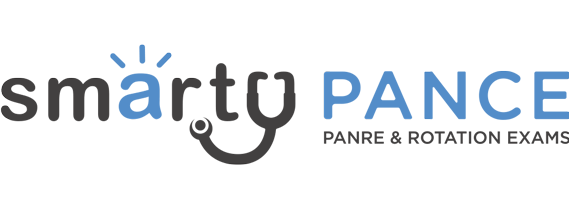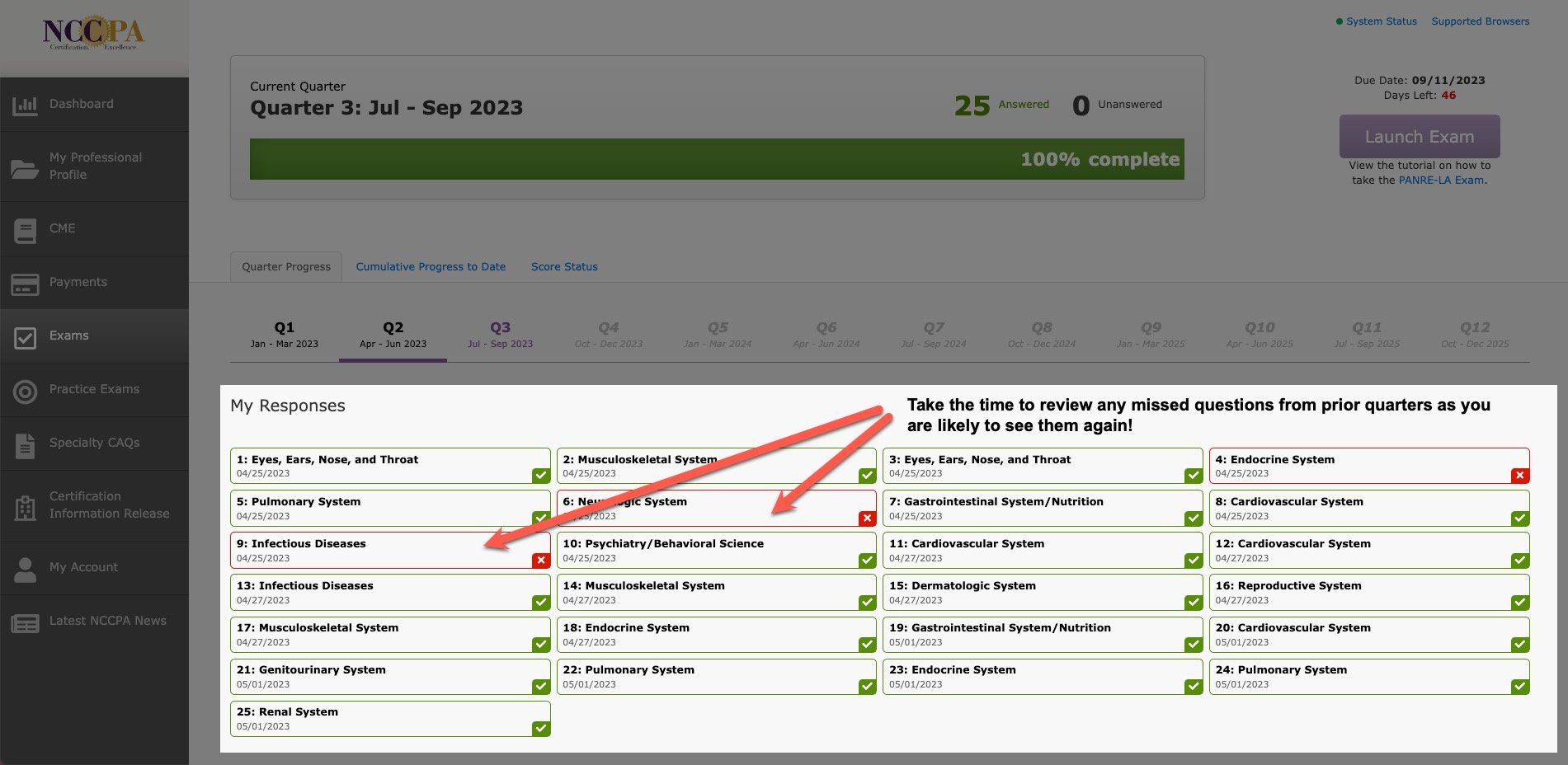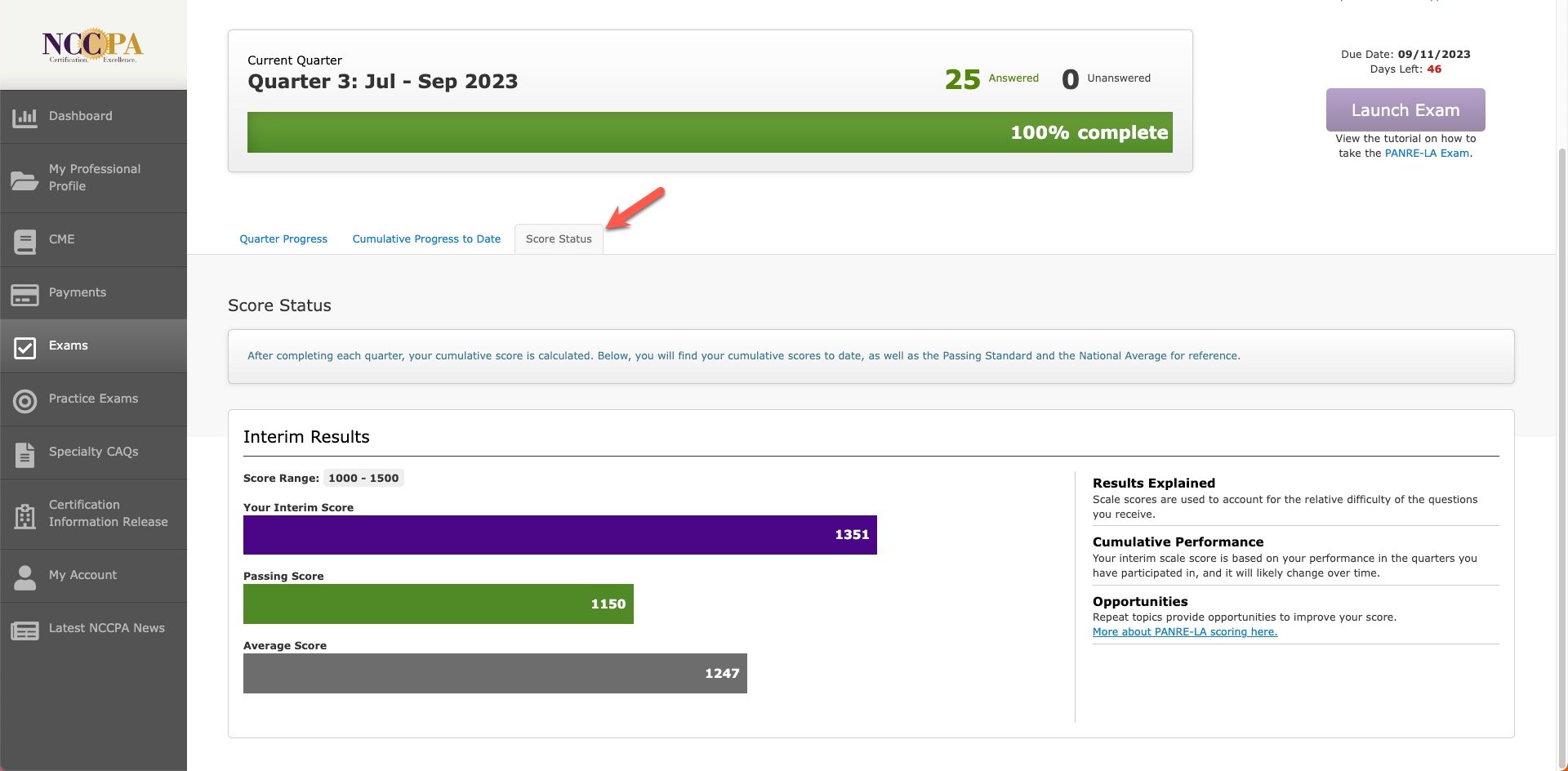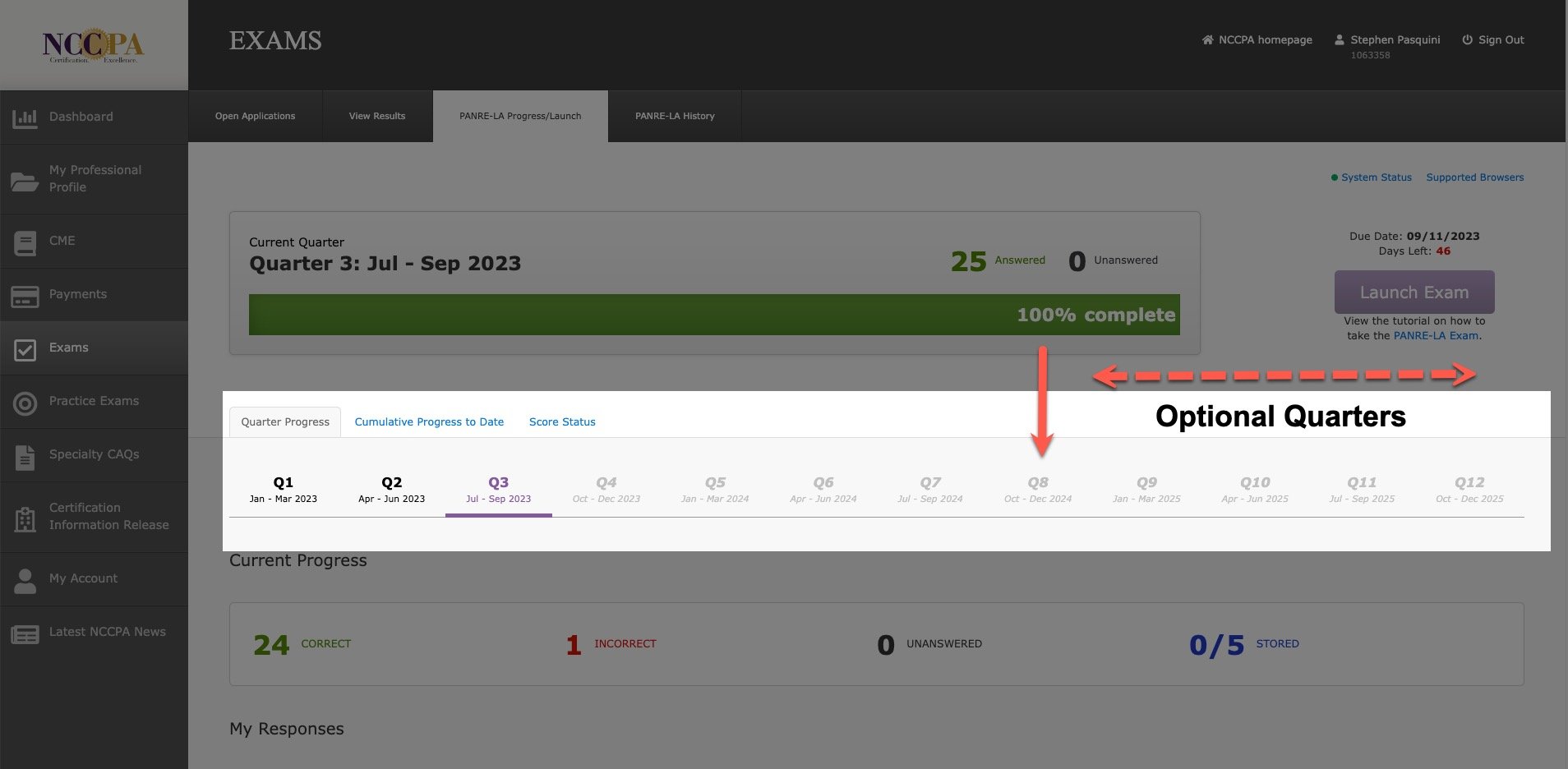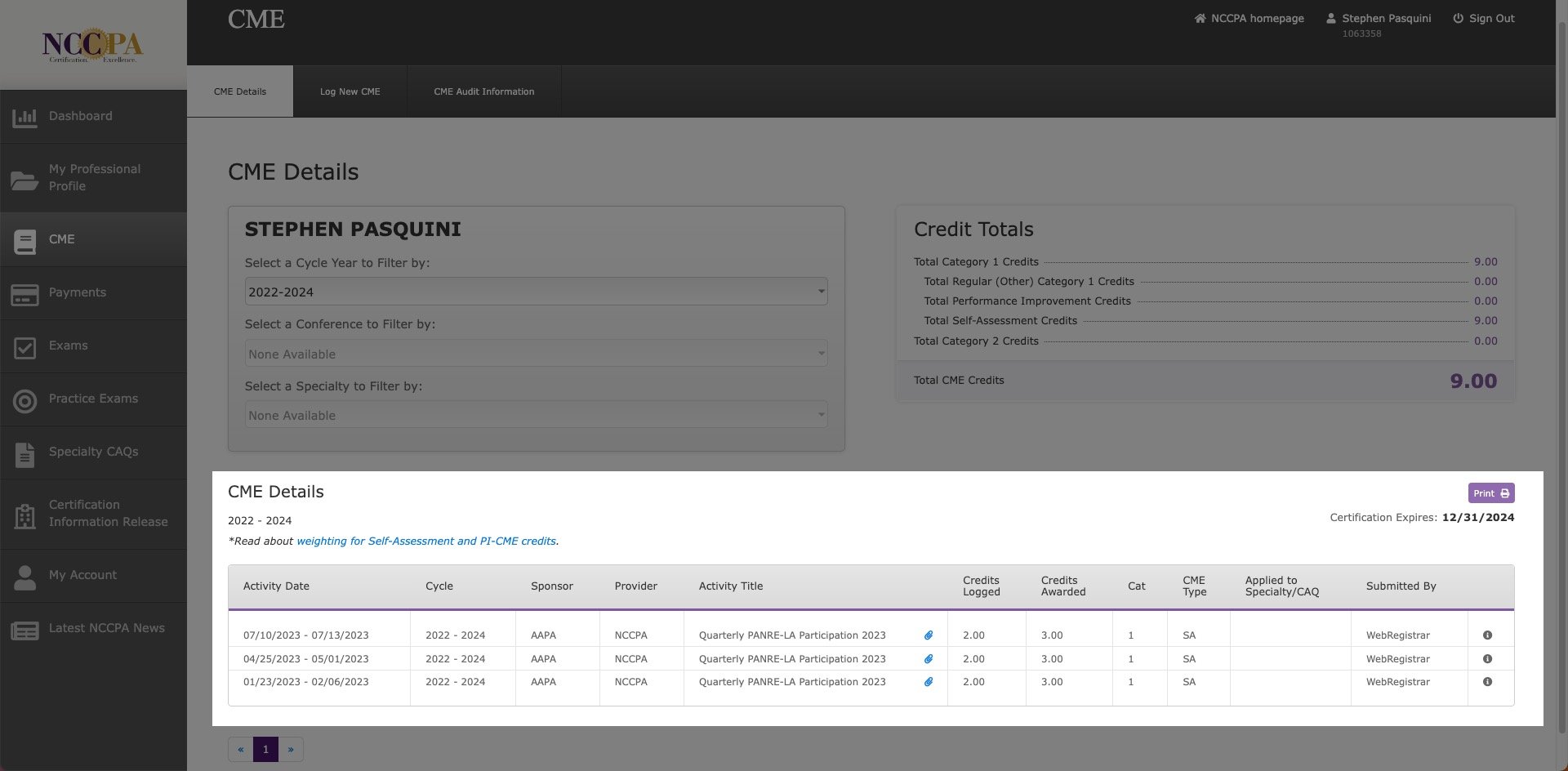
Image source NCCPA: How is PANRE-LA scored?
In the latest data from the NCCPA, 75% of practicing PAs, due to recertify, are choosing to take the PANRE-LA. This equates to just over 45,000 PAs actively enrolled in the initial PANRE-LA rollout. And I am one of them.
The initial question most of us ask when beginning an assessment is, what do I need to do to pass? That makes sense, right? You are not taking this test for fun (although it kind of is). You are taking this test to keep your license active and in good standing.
The Lifelong Learning Approach
Firstly, remember PANRE-LA is not your traditional test. It’s a unique beast, designed with the ethos of lifelong learning at its core. Its innovative format allows for continuous assessment and knowledge retention. But how exactly is your performance measured?
Scale Scoring
Most high-stakes exams, including the PANRE-LA, employ a method called scale scoring.
The beauty of this method is that it adjusts for the relative difficulty of the questions you receive, ensuring fairness across the board. No PA is unfairly advantaged or disadvantaged by receiving easier or more challenging questions than another. This means the number of correct answers needed to meet the passing standard varies slightly among participants.
Repetition for Mastery: Repeat Topics
In the spirit of fostering continuous learning, the PANRE-LA introduces an innovative feature. Starting the second quarter, you'll encounter five questions on topics you've seen in previous quarters.
The questions chosen by the computer system are not selected randomly. They're based on two things.
- Your prior performance on a particular topic (did you miss a question on a previous attempt).
- Your assessment - the survey questions at the end each question there are three of them. Two of those three ask you to assess your own knowledge: Was I confident in the answer that I produced? And, is it relevant to the things that I do day-to-day in the clinic?
Here's the kicker – the NCCPA only counts the better of your two responses for these repeat topics. If you missed a topic the first time and you get it right the second time, it's like that first attempt never happened. It goes away, and you will be scored only on that second attempt.
And if you miss the second attempt, but you got it right the first time, you will not be penalized for that. The NCCPA will only count your first (correct) answer.
This is a situation that would come up if you chose an answer correctly on your first attempt and, during the assessment portion of the question, you selected that you were not fully confident in your answer, yet you believed it to be relevant to your day-to-day practice.
The idea here is to expose you to relevant content a second time to help reinforce learning and score as best as you possibly can on an exam like the PANRE-LA.
Click here to watch the NCCPA video about repeat topics.
Navigating the Score Scale: Understanding Your Performance
The PANRE-LA score scale ranges from 1000 to 1500. With 1150 being the passing standard, your final score will be based on your cumulative performance across eight to 12 quarters. In other words, you don't need to meet the passing standard each quarter.
To help you keep track of your performance, you will see an updated score graph that reflects your performance in relation to the passing standard. Alongside your individual score, PANRE-LA also provides a view of your performance compared to your peers. While not critical for passing, it can give you a sense of how you're doing within the larger PA community.
At the end of each quarter, you can expect this graph to change over the course of the assessment.
How long is the PANRE-LA
Is the PANRE-LA eight or 12 quarters? Is it two or three years? The answer is...it depends.
The NCCPA has determined that in order to comprehend (and assess) your knowledge fully, it is going to take a bare minimum of 200 questions. Eight quarters and 25 items per quarter, that's 200 questions.
If you meet the passing standard of 11150 by quarter eight (200 questions), you are all done, and the NCCPA will notify you of your completion. If not, you will be given additional quarters in PANRE-LA to meet that passing standard, up to 300 questions.
After each subsequent quarter, scores will be recalculated using only the scored responses from the best 8 quarters to determine if the passing standard has been met, and you will be notified when they have passed. Hence you can finish in two-three years.
My gut tells me that 85-90% of PAs will be done with the PANRE-LA in two years, and most will complete the PANRE-LA in under three.
What if I don't meet the passing standard? (AKA, what if I fail my PANRE-LA?)
The application window for the PANRE-LA is in the sixth year of your 10-year recertification cycle, and the administration starts in January of your seventh year. July 5th through November 30th is the application window for recertification. The NCCPA will notify you MANY times via email. Don't hit delete on these emails! If you miss this window, you can look forward to taking the traditional PANRE.
Applying for recertification in your sixth year may seem like a buzzkill, but it offers a chance to go through the PANRE-LA assessment and still have an opportunity to maintain certification if you find that the longitudinal assessment isn't working for you.
Remember, you have up to 12 quarters, so three years thereafter, to meet the passing standard. This would be year seven, eight, and potentially nine (depending on your scores).
Now, if you reach the end of year nine and, for some reason, you haven't met the passing standard for the PANRE-LA, you will have all of year ten in which to sit for traditional PANRE.
If you are required to take the traditional PANRE, you will have up to three attempts in that 10th year to pass and maintain your certification.
You may only take PANRE once in any 90-day period. The 90-day limit on PANRE attempts is waived when (1) there are fewer than 90 days left in the 10th year and (2) you have not already exhausted all PANRE attempts for the year. In such cases, one final exam attempt is permitted.
CME Credits - A fail-to-win strategy?
You must also meet your CME requirements in addition to passing PANRE to maintain certification.
The good news for PANRE-LA participants is that for every quarter that you answer all 25 questions, you receive two category-one self-assessment CME credits. The NCCPA provides a 50% bonus for self-assessment credit, totaling three credits per completed quarter.
Assuming the majority of PAs will complete the PANRE-LA recertification process in 8 quarters, you can count on a minimum of 24 category 1 credits which is almost half of the category 1 requirement!
For those in desperate need of additional CME, you can intentionally fail two or three PANRE-LA quarters and earn an additional 12 credits. Though a valid strategy for acquiring free category 1 CME, I wouldn't recommend it. 🙂
In Conclusion
With PANRE-LA, the NCCPA isn't trying to trick you with "gotcha" questions or take away your license. It's an approach built for your success, focusing on lifelong learning, knowledge reinforcement, and continuous growth.
Remember, the journey to maintaining your certification doesn't have to be stressful. It can be a rewarding learning experience where you can track your progress, identify your knowledge gaps, and constantly improve.
Action Steps
- Learn about the PANRE-LA scoring system. The NCCPA has a number of resources available that can help you to understand the scoring system. I also recommend listening to the PA Insights podcast hosted by the NCCPA.
- Track your progress on the PANRE-LA. Use the NCCPA's PANRE-LA Progress/Launch portal to track your progress over time.
- Make a plan to improve your score. If you are not happy with your current score, make a plan to improve your knowledge and skills.
- Take the PANRE-LA when you are ready. Do not wait until the last minute to take the PANRE-LA. Take the exam when you are confident that you are ready to pass.
Here's to lifelong learning and success in our careers as PAs!
- Stephen Pasquini PA-C

